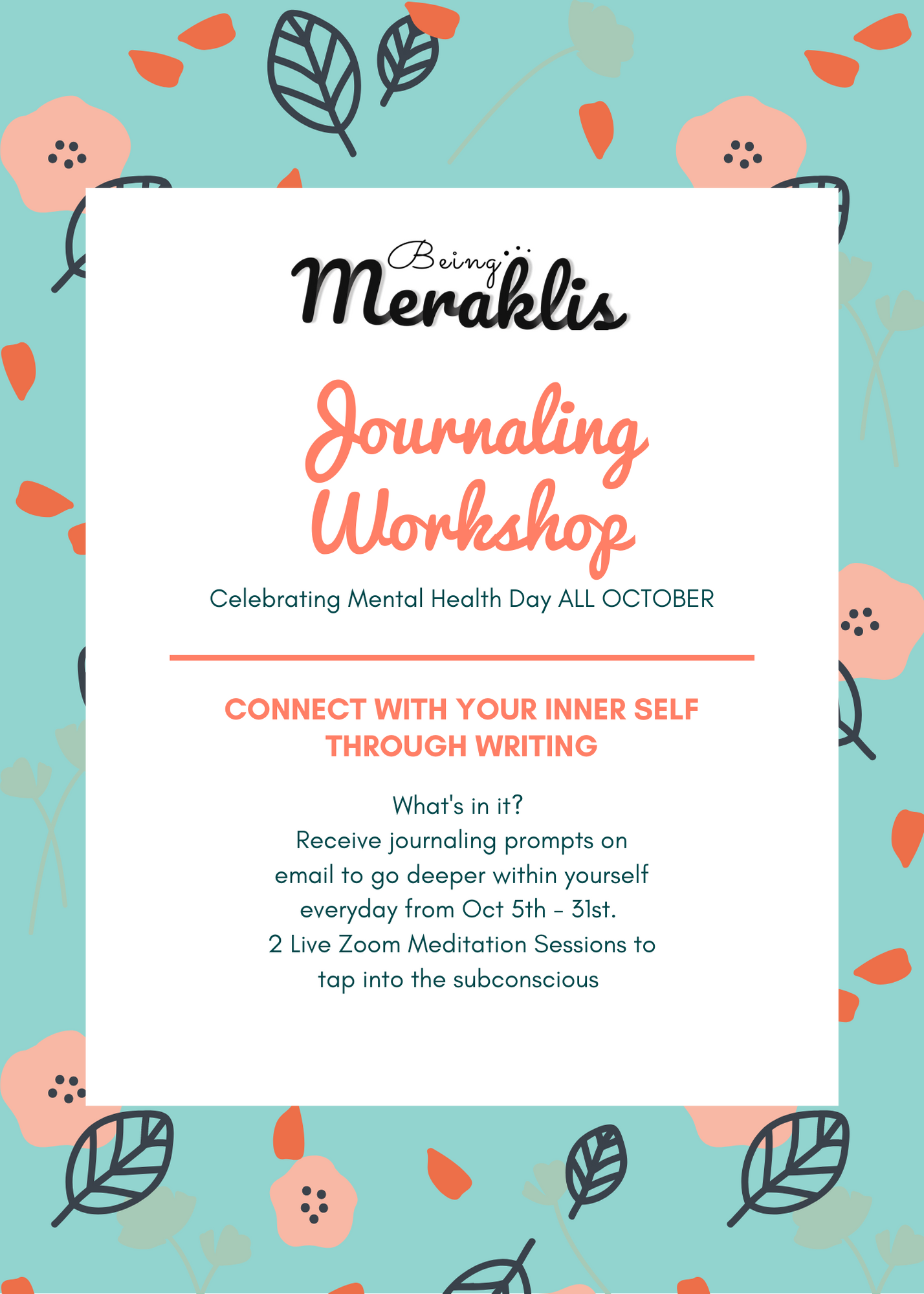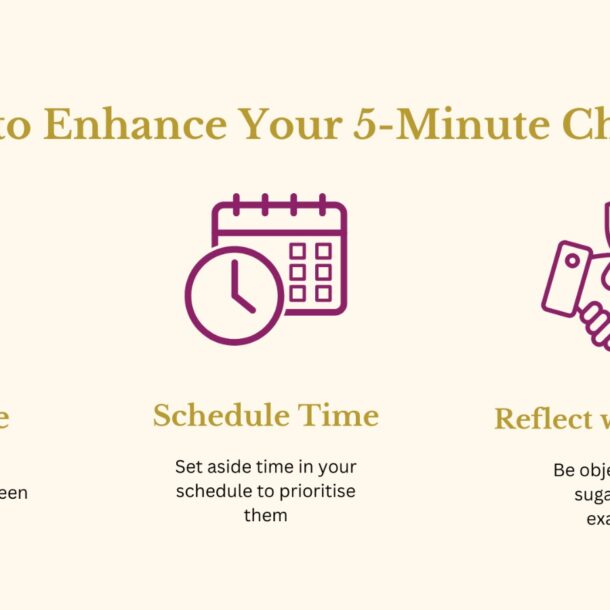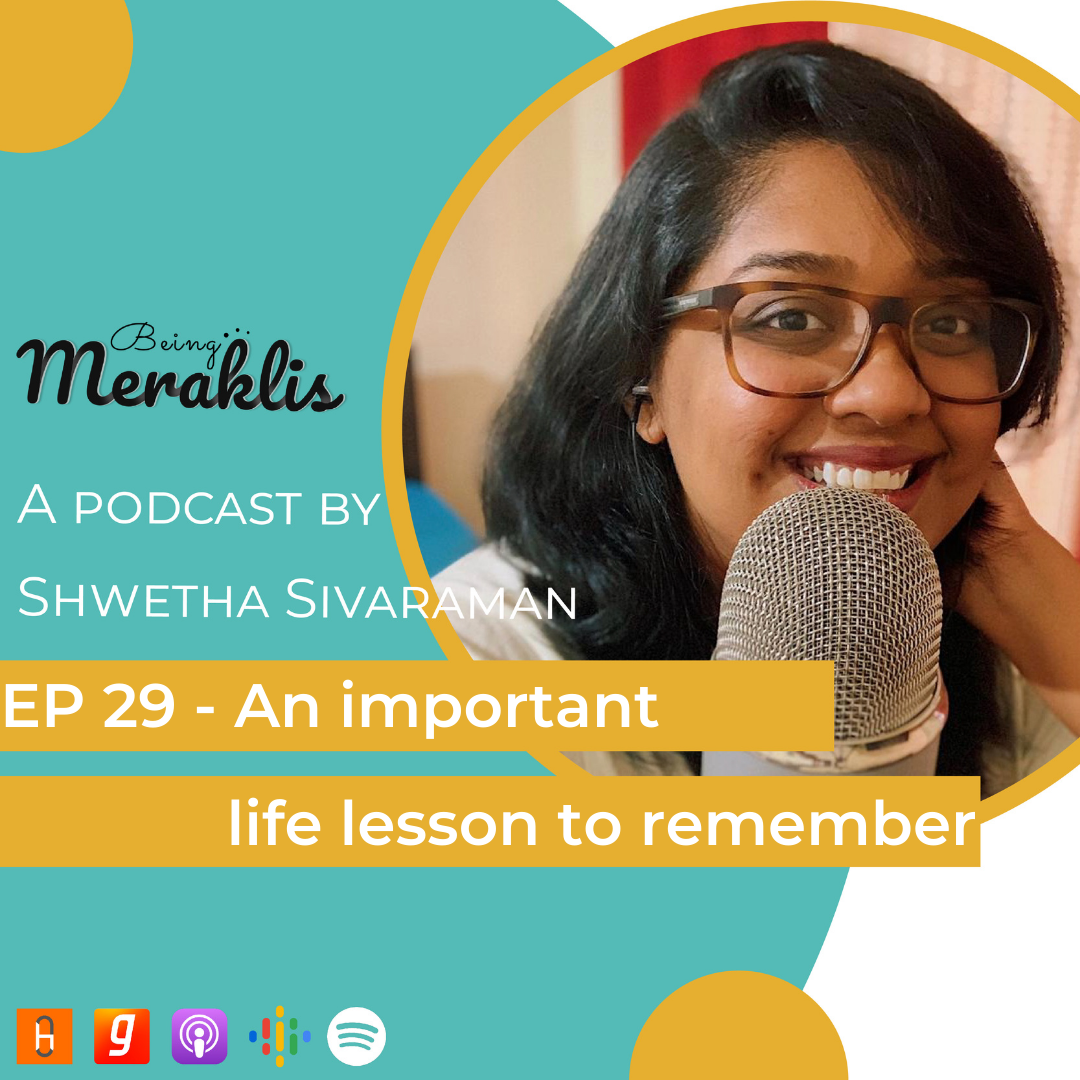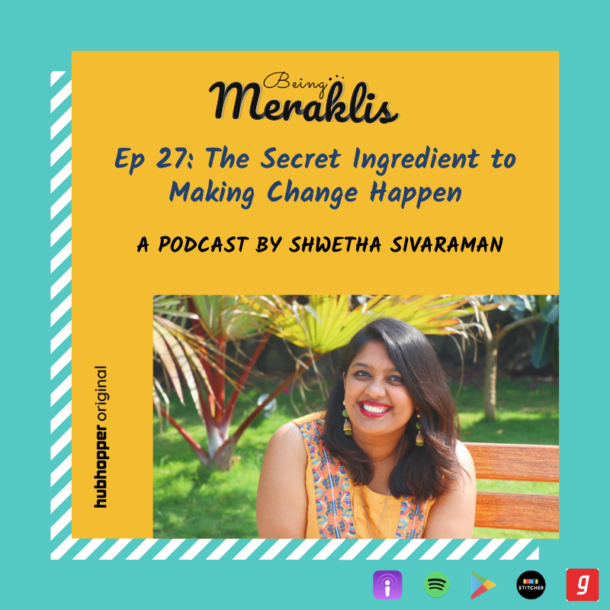
Ep28: Journaling to connect with your inner self
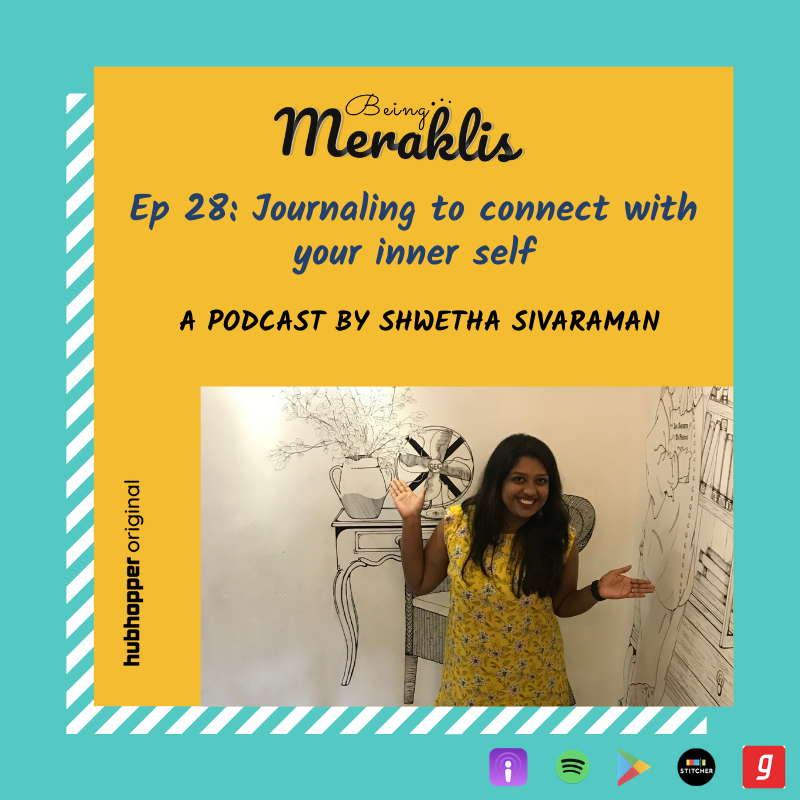 Hello and welcome to Being Meraklis a podcast by Shwetha Sivaraman
Hello and welcome to Being Meraklis a podcast by Shwetha Sivaraman
Today we are going to be speaking on something interesting – I am going to talk about journaling, how it has helped me in my life, why we should all write every day and a few simple practices on how you can get started with inculcating this habit in your daily life.
As a part of our Mental Health Awareness Initiative, I will be guiding a Journaling Workshop starting October 5th till the end of the month. You will receive daily journaling prompts, 2 zoom guided meditation sessions with me to tap into your subconscious, and free templates on completing the workshop for each of the journaling methods listed in the podcast. Click here to sign up for it.
I think I started writing somewhere in my late teen years, in 2006 or 2007 probably. It was just a few words, notes here and there. Cheesy poetry that didn’t rhyme, I’ve never been able to write poetry that rhymes for some reason I can never find those rhyming words. Don’t worry I am not going to read those lame works here. I used to always write when there was an emotional overwhelm. I was a quiet kid growing up – I talked a lot but never anything personal. What went on in my head was always private shut behind iron bars only for my own torture. I used to dwell, brood, and grieve the smallest of things alone in my head, and when that got a little too much, I’d pick up a pen and paper and release it. Quick bursts of words and emotion streaming, so many of my writings then are blurred with tears that accompanied the writing.
But that’s how writing has always been for me, a release, an expression for the unexpressed torment, a sweet escape to lighten the heavy heart, as if I was sending word out to the universe, a silent prayer to relieve me from all that heaviness, and it worked for me.
But overtime writing became more than just that. I wrote when inspiration struck, released them in bursts of words when the overwhelm got to me, articulated complexities when things were fuzzy, relished each word when I was happy and soon it became a part of me. I had journals for everything, for work, for self, for dreams, for visions, for growth, for books I loved and what not. Years of such journals are so amazing cause now when I look back, I can trace to every single place I’ve grown and wow how beautiful it is to be able to trace that back.
Journaling has helped me on so many levels, but I am going to brief in sharing a few things writing could help you with too.
1.Gave meaning to my experiences
If you were to just go by life and its usual grind of wake up eat, go to work, and sleep, it is bound to get meaningless soon. Writing gave meaning to my experiences that changed from every day even if I were doing the same set of things. Writing helps you get perspective on what you feel and think and do and allows you to reflect on what you can do differently. As the saying goes
“We write to taste life twice, in the moment and in retrospect.” ~ Anais Nin
2. Gave clarity when nothing was clear
We’ve all faced this in our lives where everything seems fuzzy. We know we must make a choice but no path seems clear. We keep running around in circles not knowing the path out of the maze of our own drama in our lives. Writing can help you sort priorities and express things in clarity in a way you never could have otherwise.
3. Gave relief when the heart was heavy
This one is a no brainer. I’ve used this form of writing the most and it has helped me unburden the worst of toxic emotions onto a paper and forget about it. Emotional overwhelm is real, we all go through those phases, especially as women, as changes happen within us with every moon cycle, there is excess bouts of feelings – happiness or sadness. Writing helps process emotions like no other. A brain dump during an emotional upheaval can relieve you almost instantaneously. A good cry works too, but the words you write can be reflected on at a later date.
4. Gave joy when celebrating the little things
Me and my husband spent years apart across timezones after our MBA days and before our wedding. And in all that time apart, writing about those rare occasions we managed to meet and just hang out, have a cup of coffee together, or chat for hours on god knows what, used to be therapeutic for me. It almost felt like he was right there with me and not 10000 miles away. One of the best ways to reminiscent the little things in everyday life is to write what gave you the most joy. For example, even in the lockdown there are those small moments – video calling your loved ones, that hug in the morning, burning the kitchen down with cooking experiments, arguing about who’s turn it is to do the laundry, that sip of coffee together on a slow day. I could go on, but the joy of each of these little things get multiplied when we write and capture it in our memories for later.
5. Gave expression to unconscious desires
This is one of the most powerful things writing gave me. Writing daily a practice I probably followed just in the last 4-5 years has been so humbling. I don’t write with any particular agenda, I usually just wake up and write what I feel or write something over the weekends when time permitted. And there’s so much wisdom I can learn from them now from my 2015 or 2016 journals. When I was shifting houses last year in 2019, I stumbled upon a diary from 2015 and there I found something written so clearly I had to take a double look to be sure. I had written the words I am not happy, I want to be a writer in December 2015. That was the time I used to work 16 hours at my work, was at my professional peak when it comes to job satisfaction. I was working towards growing in my corporate career, all set to become that CXO somewhere down the line. I never registered this then either I am sure because I never even took one move in that direction. 5 years later that seems to have happened after so many wrong turns and I thought I became a writer by consequence of random events. To realize that I have been wanting to do this subconsciously for 5 years was a stark revelation. Who knew. I didn’t but writing helps recognize these inner unconscious beliefs we probably know not of.
6. Give insight into who you are
This one is a gem. We all think we know who we are, what our likes and dislikes are, our preferences are, our nature and behaviors are. But more often than not our assumptions are but the tip of the iceberg. We all have layers within us, that we are only barely discovering. And as we grow and experience more life, we evolve continuously, and writing is a beautiful way to pulse check where we are on our growth journey, to register successes of how far we have come, to remind us of lessons we must keep in mind to keep moving forward, to help us draw boundaries on what’s acceptable and not.
There’s often common disbelief that writing is just for writers, but from my experience, I’d say absolutely not. Writing is for everyone. As we make way through this maze of life, writing is a crucial technique to observe, reflect, make sense, and plan for what we want out of this life. It is for everyone.
Convinced but not sure where to start journaling? Don’t worry I got you covered.
The best way to get started on writing is by keeping a daily journal. What to write in the journal you might ask?
Well so many things
1. Morning Journaling
Well, this is a beautiful way to begin the day. If you pay attention, you’d notice that you wake up in very different moods every single day. Starting each morning with What are you feeling today, could be a great way to understand what triggers you and be more conscious throughout.
Mornings could also be used to intentionally start your days. What do you plan to do in the day? Why is that important for you? What would you get if you do it? What do you stand to lose if you don’t? Each of these questions helps you prioritize what’s important every single day and be more intentional as you navigate your day-to-day activities.
2. Evening Journaling
Not a morning person? There’s another way journaling can be used at the end of every day to capture thoughts, emotions, and progress in a day. You could start a winding down routine just before you wrap up work for the day to help capture how your day was, what went well? What didn’t? What challenged you? What made you uncomfortable? What could you do differently? A simple technique that probably takes less than 10 minutes to capture but can be powerful to understand yourself in the long run.
3. Stream of Consciousness journaling
Not sure you want to commit to writing every morning or evening, then this one’s for you. As the name suggests, you write when you feel like it and without a structure and allow everything that comes to your consciousness to come on to the paper – no policing, no judgments. You’ll be surprised at how much something as simple as this could be revealing.
4. Gratitude Journaling
The most abused form of journaling in our generation. But please don’t force this. Don’t force yourself to write 10 things to be thankful for, it doesn’t work that way. If you forcibly write I’m thankful for the roof over my head, my silly husband, and my crazy family without any emotions, its as good as nothing. Start small, and only write what you are truly truly grateful. The more powerful the emotion, the more you start to feel automatically.
5. Visualization
Preferable to do this after a deep meditation but this is a beautiful way to picture your future – What is it you are doing? With whom? What emotions do you feel? The subconscious is a great place to tap into to understand your self, your desires better. Just meditate for 10-15 minutes with visualization on how you want your life to be a few years from now and once done pick up your pen and paper and start writing. The clarity could leave you astounded sometimes on how thick you’ve been limiting yourself to conscious logic alone to finding true answers.
Irrespective of what vocation or profession you follow in life, try inculcating 5-10 minutes of journaling every single day, it could connect you to your deeper self faster than any other technique. Also, since October is mental health awareness month, I thought of running a journaling workshop throughout the month to help you establish that connection with the inner self and accept yourself better.
Click here to register for the FREE Journaling Workshop starting October 5th, 2020.
All you will need is 10 minutes every day to write to journaling prompts that I will share via email. I’ll also do a few guided meditations over weekends to help you get started on doing these techniques on your own after October. If you are looking to start a journaling practice this will be a great way to kickstart it you’ll have me as your accountability partner as you work through your emotions during the process.

